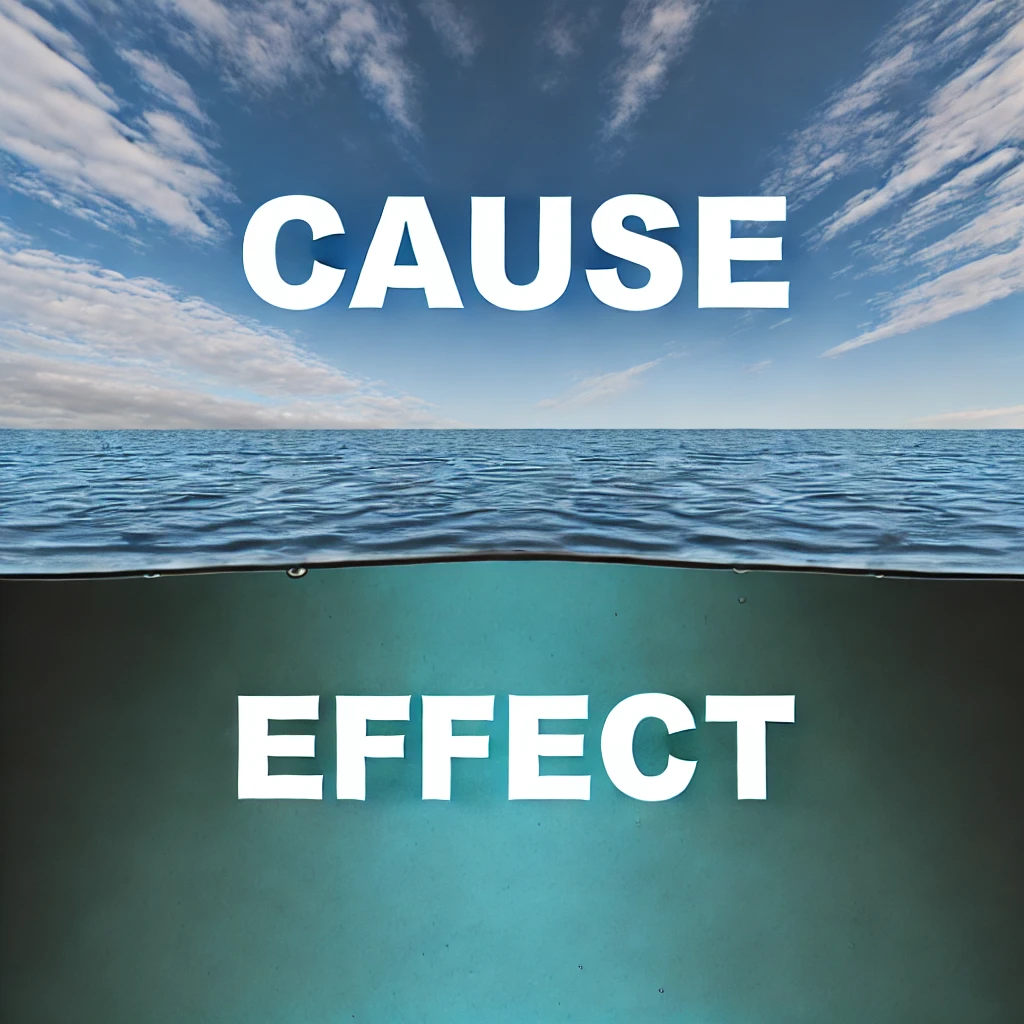Cause or Effect: The Choice is Yours
Every aspect of your life comes under two categories: things you are at CAUSE over and things you are the EFFECT of.
For example, you are either at CAUSE with your work and succeeding, or you are at EFFECT of your work and failing. You are at CAUSE or EFFECT with your health, your relationships, your money, your possessions and every other area of your life.
10 Signs You Are at EFFECT in an Area
- It gives you pain or stress
- You feel hatred or anger
- You think about it too much
- It is disorderly
- It ruins your focus
- You dislike similar things
- You do things that make it worse
- It makes you get ill or hurt yourself
- You lie to others about it
- You want to stop it
10 Signs You Are at CAUSE in an Area
- It gives you joy and pleasure
- You keep it organized and orderly
- It helps increase your income
- You teach others how to do it
- It makes you proud
- You look forward to doing things with it
- It helps you reach your goals
- It makes you feel powerful
- It gives you passion and energy
- You want to create with it
Example
Bob, the car mechanic, is very good at fixing radiators, but not very good with brakes.
He looks forward to radiator jobs. He knows every type of radiator that exists, and can easily fix or replace them. Customers never come back with radiator problems. Bob is at cause over radiators.
However, whenever Bob gets a brake job, he slows down. He can’t find the right parts or and smashes his fingers. Customers come back with complaints about their brake work. Bob is at the effect of brakes.
To Succeed, You Need to Rise to Cause
Below is a self-improvement procedure you can do to get more at cause over your job (post). You can use the same steps to get at cause over ANYTHING in your life.
“Write down any and all points where one feels he is NOT at cause over his post.
“Then look at points one after another where one can be at cause.
“And one comes to cause over his post.
“Try it.” — L. Ron Hubbard
Five Steps to Go from Effect to Cause
- Choose an area where you are at EFFECT.
- List each point that you are NOT at cause over.
- Choose one point for which you CAN be at cause.
- Repeat with any other points on your list you feel you CAN be at cause.
- Once you are at CAUSE over each point, write a plan to stay at cause.
Example
Let’s say you are a chef at a small, gourmet restaurant. You normally love your job but you now have a lot of stress. You do not look forward to working any longer.
1. Choose an area where you are at EFFECT.
You don’t like managing your assistant, Hunter. He drives you crazy with mistakes and laziness, and his appearance.
2. List each point you are NOT at cause.
You write down three main problems regarding your assistant Hunter.
#1: “He takes too long to prepare the salads.”
#2: “He gets the wrong ingredients half the time.”
#3: “His neck tattoo really annoys me.”
3. Choose one point for which you CAN be at cause.
You pick #1 and ask yourself, “How can I be at cause over his slow salads work?”
You watch what Hunter does. You ask him, “Why do you wash each salad part after you cut it?”
He says, “I thought I was supposed to do it that way in case the knife is dirty.”
You show him how to keep the knife clean instead of washing the vegetables. He says, “OH, that will save me a lot of time!”
4. Repeat with any other points on your list you feel you CAN be at cause.
You ask about #2. “Hunter, why do you bring me the wrong ingredients some times?”
He says, “I just follow the signs on the shelf.”
You go back to the storage area and see no one has changed the signs in years. You fix the signs so they match the ingredients. All is well.
You pick #3: the neck tattoo, but you can’t think of how to get at cause on this.
You realize you need to get at cause over your annoyance. You are effect of your FEELING.
So you decide it doesn’t matter how Hunter looks as long as he does his job. You are now at CAUSE of the negative feeling.
5. Once you are at CAUSE in the area, write a plan to stay at cause.
You write, “When Hunter messes up, ask questions. If I’m annoyed about his appearance, stop the feeling; he can look however he wants. I’m now at cause with Hunter!”
Learn more about being at cause over things you cannot control.
Example: Jane is Effect of Dating
Jane really wants to get married. Let’s say her post or job is “Single female in search of husband candidates.”
Unfortunately, she can’t find anyone she likes or who likes her. If an unattractive man smiles at her, she quickly looks at the floor. If a man asks her on a cheap date, she lies and says she is too busy. She spends all of her nights at home with her cats.
Jane will never get married because she is EFFECT.
Jane lists six points where she is NOT at cause.
#1 “I believe men think I’m ugly.”
#2 “I can’t find the man of my dreams; someone who looks like John Travolta.”
#3 “I worry a man will hurt me.”
#4 “I want my friends to be impressed with my dates.”
#5 “I never get to meet men who are rich enough to support me and my cats.”
#6 “I’m scared I’ll never get married and will be alone forever.”
Jane looks at these points and picks one that she CAN be at cause over, #4.
She writes, “I shouldn’t worry about what my friends think. If they are friends, they’ll support me. If not, who cares what they think. OK, I can be at cause on that point.”
She then picks #5: “Am I looking for a man who pays my bills so I can live the good life? I think this attitude hurts me. A good husband may or may not be rich. I can be at cause over this stupid attitude of mine. I like to work anyway. If he’s a good man doing good things, maybe I’ll support him!”
She looks over the remaining points and picks #1: “If they think I’m ugly, I don’t want anything to do with them. I’ll just be myself.” This puts her at cause.
She picks #2: “OK, I can get at cause over this idea I need a man who looks like a movie star. That’s as silly as me worrying about being ugly. He only needs to look attractive to ME. I feel at cause over this one.”
She looks at #3: “Why do I worry a man will hurt me? It’s never happened to me or anyone I know. My mom worries about it all the time and constantly tells me to be careful. If I stop listening to her and use my own common sense, and take reasonable precautions when dating, I’ll be fine. I can be at cause over this fear.”
Jane now has has only one point left, #6. She quickly gets at cause over this fear. “What do I care if I never get married. I like myself and I’m happy to be alone. I also like my cats. If I meet a good man and we’re interested in each other, great. If not, that’s fine also.”
Jane writes down her plan to stay at cause. She then meets a single guy who loves cats.
Example: Gerald is Effect of Money
Every hour of every day, Gerald thinks, “Why is it so hard for me to make money? Will I always be broke? This stress is not good for me.”
Gerald decides to get at cause. He writes down these points where he is NOT at cause.
#1 “I can’t get find a good job that pays me what I’m worth.”
#2 “My debt’s getting higher because I’m only paying the interest on my new BMW.”
#3 “I’m already 40 and I have saved nothing for retirement.”
#4 “I can’t sleep because of the stress which makes me get less work done.”
#5 “My dad said he’d loan me some money, but I can’t reach him right now.”
Next, Gerald picks one point after another where he CAN be at cause.
“I can be at cause over #5 and stop waiting for my dad to give me money. It’s not his problem and I can’t wait for him. Another loan is not what I need anyway. OK, I won’t bother him any more.”
“OK, for #2, I made a mistake. I need to sell the BMW and get out of that horrible loan. My old Toyota is still working.”
“I can be at cause over #3 and stop worrying about retirement. It’s a future problem and not worth my attention right now. I can be at cause over this feeling.”
“#1 is the main thing I need to fix. Apparently, my work is not worth very much. I need to get off my butt and increase the value of what I do. If I focus on this one thing and nothing else, I’ll be at cause on this.”
This realization was exactly what he needs. He automatically rises to cause over #4 as his stress is gone.
Gerald writes down his plan. He knows it will work. He is at CAUSE.
Example: Kim Hates to Exercise
Once again, Kim’s doctor tells her she needs to exercise to handle her arthritis pain and have more energy. She knows this is true, but she is effect of exercise.
She says to herself, “OK, I’m going to list all the points where I’m at effect of exercise.”
#1 “Exercise is boring.”
#2 “It makes me tired and ruins my energy for the day.”
#3 “It makes me feel a little sick.”
#4 “I get no pleasure from this. It ruins my mood.”
Kim looks over the points and picks one she CAN get at cause over.
“I can listen to some music for #1 so it’s not so boring. I’ll try something very energetic like rap!”
Kim gets on her exercise bike, turns on her music and pumps as hard as she can for five minutes.
“That’s kind of fun, not as boring, but I feel kind of sick. I’ll try it again tomorrow.”
Kim thinks about #3. Can she get at cause on this one? She looks online to see why she might feel sick. She learns she should slow down and drink more water for nausea.
“Oh, I can do that.”
The next day, she goes slower and completes a ten minute exercise session with her music. She does not feel sick and is now at cause on #3.
Kim finds ways she can be at cause #2 by waiting to exercise until the end of the day. It doesn’t matter if she uses up her daily energy now, and she sleeps better. She is at cause on #2.
She picks #4. “I think I can control my mood.”
“Everyone says exercise is a pleasure. That’s never going to happen for me. Who cares if exercise gives me pleasure or not? I’m doing it for health, not for fun.” This puts her at cause as never before. She feels happy, not from exercise, but from being at CAUSE over exercise.
She increases her time and distances until one day, she realizes, “Hey! I have more energy these days. No pain either. I’ll tell my doctor he’s right!”






